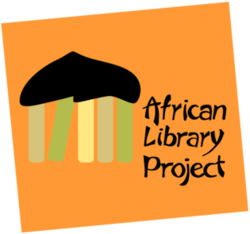African Library Project
The African Library Project (ALP) is a non-profit organization that starts libraries in rural Africa. U.S. volunteers organize book drives and ship books to a library in Africa. ALP partners with governmental and non-governmental organizations in sub-Saharan Africa. The partners process applications from schools and communities that want libraries, distribute the books, and provide training. Schools and communities that receive books provide the library space and staffing. ALP works in Botswana, Ghana, Kenya, Lesotho, Malawi, Sierra Leone, and Swaziland.
 | |
| Founded | 2005 |
|---|---|
| Founder | Chris Bradshaw |
| Focus | Literacy |
Area served | Sub-Saharan Africa |
| Website | http://www.africanlibraryproject.org |
ALP is a US 501(c)3 organization founded in 2005 by Chris Bradshaw.[1] In the first eleven years of operation, ALP started over 1,900 libraries in sub-Saharan Africa.[2]
Methods of operation
ALP volunteers in the United States collect used, donated books for later shipment to affiliated libraries in Africa. The volunteers then sort, pack, and ship the books via sea container, for eventual delivery to a designated African school or community.[3]
A typical small library is one thousand (mostly paperback) books. As of August 2016, the cost of shipping the books to Africa is about $500: $250 in U.S. domestic postage to mail the books to a consolidation point in New Orleans, LA, , and $250 sent to ALP to defray the costs of container shipping.
ALP partner organizations are large governmental and non-governmental organizations that vet schools and communities that want libraries. When the containers arrive, they contain books for 30-60 libraries. The partners distribute them and also provide training and oversight of the libraries.[4] In Botswana, the partner is the Botswana Ministry of Education. In Ghana, the partner is the Michael Lapsley Foundation.[5] In Kenya, the partners are Project Humanity[6] and Rongo University College.[7] In Lesotho, the partners are US Peace Corps Lesotho[8] and the Ministry of Education and Training. In Malawi, the partners are DAPP Malawi,[9] Wungwero Book Foundation, and Malawi Institute of Education.[10] In Sierra Leone, the partner is RISE Network; in Swaziland, Fundza.
Teachers and administrators of the target schools are given a manual on managing a library based on one developed by Voluntary Service Overseas (VSO). . Librarians collect data on usage and attend training provided by the partners and ALP. Librarians from all the countries where ALP is working meet at the biannual Library Summit to share best practices.
Each library requests the specific types of books they need. In addition to the donated books, ALP purchases supplemental books for the libraries: the Junior African Writers Series (JAWS) HIV/AIDS readers (published by Pearson) and Hesperian Health Guides.
References
- Moody, Shelah (July 9, 2006). "JEFFERSON AWARD: Presented to Chris Bradshaw / Trip to Africa planted seed that blossomed into library project". San Francisco Chronicle.
- Risley, Michealene. "The African Library Project Goal: Eradicate Illiteracy in Africa". Huffington Post.
- ElKorchi, Miriam (May 7, 2013). "Chris Bradshaw ships books to Africa to help make the impossible possible". Christian Science Monitor.
- "Reading Initiative Salone (RISE) Network trains 50 librarians". Sierra Express Media. July 21, 2015.
- "Michael Lapsley Foundation". Archived from the original on 2015-08-01. Retrieved 2015-08-09.
- "Project Humanity".
- "Rongo University College".
- "US Peace Corps Lesotho". Archived from the original on 2011-02-05.
- "DAPP Malawi".
- "Malawi Institute of Education".